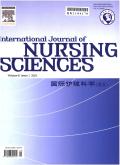Current situation and influencing factors of palliative care practice ability among oncology nurses: A multicenter cross-sectional study
IF 3.1
3区 医学
Q1 NURSING
引用次数: 0
Abstract
Objectives
The study aimed to survey the current situation and explore the factors that influence the ability of palliative care practice among oncology nurses.
Methods
A multicenter cross-sectional study was conducted using stratified random sampling to select 26 tertiary hospitals’ oncology departments in Hubei Province, China. A total of 1,198 nurses were included and finished the questionnaire consisting of social demographic characteristics, Palliative Care Self-Report Practice Scale (PCPS), End-of-life Professional Caregiver Survey (EPCS), and Self-Perceived Pain Assessment Knowledge and Confidence Scale (Self-PAC) through the online platform. Data were analyzed using t-test, one-way ANOVA, Pearson correlation analysis, and multiple linear regression analysis in SPSS 26.0.
Results
The total score for PCPS was 67.17 ± 12.57, the three dimensions’ scores were: physical symptom care (32.50 ± 6.10), spiritual and psychological care (23.35 ± 4.97), communication (11.58 ± 2.48). There are significant positive correlations between the palliative care practice ability and core competence (r = 0.77, P < 0.01), as well as pain assessment ability (r = 0.56, P < 0.01). Multiple regression analysis identified female, with high education background (bachelor’s degree and master’s degree or above), interest in palliative care, pain assessment ability, and core competence were positive predictors of palliative care practice ability (Adjusted R2 = 0.668, P < 0.05).
Conclusions
The overall ability of the oncology nurses to practice palliative care was relatively high, but the palliative nurses reported suboptimal performance in the communication dimension of palliative nursing practice ability. To comprehensively improve oncology nurses’ palliative care practice ability, managers must consider the gender structure, educational background, enthusiasm for palliative care work, core competence, and pain assessment ability.
肿瘤科护士姑息治疗实践能力现状及影响因素:一项多中心横断面研究
目的调查肿瘤科护士姑息治疗实践能力的现状,探讨影响姑息治疗实践能力的因素。方法采用分层随机抽样的方法,对湖北省26家三级医院肿瘤科进行多中心横断面研究。共纳入1198名护士,通过网络平台完成社会人口学特征问卷、姑息治疗自我报告实践量表(pps)、临终专业照护者调查问卷(EPCS)和自我感知疼痛评估知识与信心量表(Self-PAC)。采用SPSS 26.0软件进行t检验、单因素方差分析、Pearson相关分析和多元线性回归分析。结果ppps总分67.17±12.57分,三个维度得分分别为:躯体症状护理(32.50±6.10)分、精神与心理护理(23.35±4.97)分、沟通(11.58±2.48)分。姑息治疗实践能力与核心竞争力呈显著正相关(r = 0.77, P <;0.01)、疼痛评估能力(r = 0.56, P <;0.01)。多元回归分析发现,女性、高学历(本科及硕士以上学历)、对姑息治疗的兴趣、疼痛评估能力、核心能力是姑息治疗实践能力的正向预测因子(调整后R2 = 0.668, P <;0.05)。结论肿瘤科护士姑息治疗实践能力总体较高,但姑息治疗护士在姑息治疗实践能力沟通维度表现欠佳。要全面提高肿瘤科护士的姑息治疗实践能力,管理者必须考虑护士的性别结构、学历、对姑息治疗工作的热情、核心竞争力和疼痛评估能力。
本文章由计算机程序翻译,如有差异,请以英文原文为准。
求助全文
约1分钟内获得全文
求助全文
来源期刊

International Journal of Nursing Sciences
Nursing-Nursing (all)
CiteScore
6.10
自引率
2.60%
发文量
408
审稿时长
25 days
期刊介绍:
This journal aims to promote excellence in nursing and health care through the dissemination of the latest, evidence-based, peer-reviewed clinical information and original research, providing an international platform for exchanging knowledge, research findings and nursing practice experience. This journal covers a wide range of nursing topics such as advanced nursing practice, bio-psychosocial issues related to health, cultural perspectives, lifestyle change as a component of health promotion, chronic disease, including end-of-life care, family care giving. IJNSS publishes four issues per year in Jan/Apr/Jul/Oct. IJNSS intended readership includes practicing nurses in all spheres and at all levels who are committed to advancing practice and professional development on the basis of new knowledge and evidence; managers and senior members of the nursing; nurse educators and nursing students etc. IJNSS seeks to enrich insight into clinical need and the implications for nursing intervention and models of service delivery. Contributions are welcomed from other health professions on issues that have a direct impact on nursing practice.
 求助内容:
求助内容: 应助结果提醒方式:
应助结果提醒方式:


